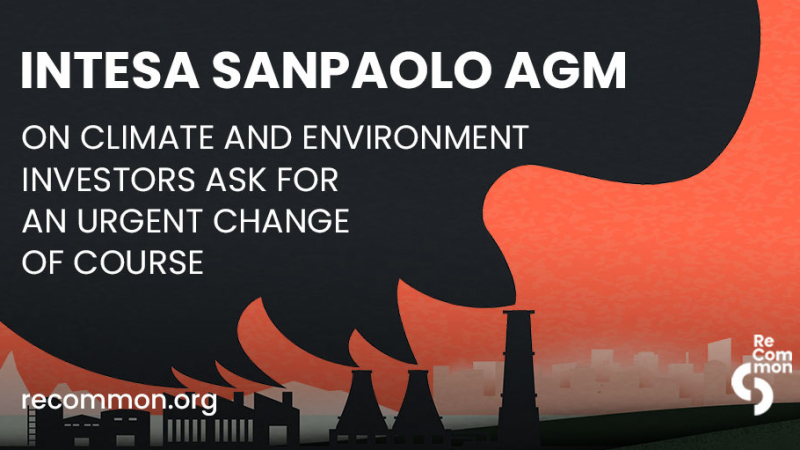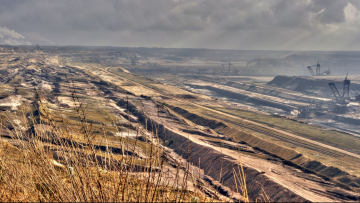Intesa Sanpaolo shareholders’ meeting

On the occasion of the Shareholders’ Meeting of Intesa Sanpaolo, ReCommon highlights the high exposure of the top Italian bank to the fossil fuels sector and disclose a letter signed by a group of investors urging Intesa’s top management to raise the level of ambition of its commitments on climate and the environment.
This year’s shareholders’ meeting, that will be held behind closed doors for the third year in a row even though the group’s statute provides for telematic participation methods that are not granted, is an important opportunity for shareholders to urge the bank to raise its climate ambition.
In this sense, a group of investors sent a letter to the CEO of Intesa Sanpaolo, Carlo Messina, expressing concern about the banking group’s high exposure to the fossil fuels industry, despite the first commitments taken by the bank on coal and unconventional oil&gas.
Signatories of the letter are Ecofi Investissement and Bank fur Kirche und Caritas, both members of Shareholders for Change and ACTIAM, Dutch asset manager with assets amounting to EUR 20 billion who recently announced its divestment from TotalEnergies, expressing concern about the involvement of the French company in the devastating East African Crude Oil Pipeline (EACOP) project.
In 2021 alone, Intesa Sanpaolo granted US$ 6.4 billion* to coal, oil and gas. On the coal sector, the financial exposure is mainly driven by the subscription of bonds (increased sixfold between 2020 and 2021) where the proceeds are linked to generic purposes, most often the core business of fossil fuels companies. Financing also includes US$ 136 million to the Sasol (South Africa) and, above all, US$ 226 million to RWE (Germany), the most polluting company in Europe. On oil&gas, between 2016 and 2021 Intesa Sanpaolo granted US$ 5.5 billion to six of the eight fossil fuels companies listed in the three main rankings of Urgewald’s Global Oil and Gas Exit List: Chevron, Exxon, Equinor, Gazprom, Shell and Total. As for investments in the fossil fuel business, as of 1 January 2022 they amounted to EUR 4 billion.
This high and growing exposure to the fossil fuels business is the result of climate commitments that are vague, weak, and limited. In light of these factors, the group of investors has written to Intesa’s top management with the request to bolster its coal policy – in order to include all financial services and provide for a phase out date from the entire coal sector, not only coal mining – and to expand the applicability of its policy on non-conventional oil&gas, primarily by excluding the possibility of financing onshore projects in the Arctic, such as those of the Russian company Novatek, which Intesa Sanpaolo financed (Yamal LNG, 2016) and committed to finance (Arctic LNG-2, 2021).
"This year too it was not possible to attend in presence the Shareholders’ ‘Meeting and urge the bank’s management to improve its climate commitments", comment Daniela Finamore and Simone Ogno of ReCommon. "Little ambition, too many gaps and loopholes allow Intesa to continue to support, in an increasing way, the fossil fuels industry. For this reason, Intesa is considered the No.1 fossil bank in Italy. Even those who invest in the banking group are asking for an urgent change of course that is in line with the urgency required by the climate crisis".
*The data, as of 01.01.2022, have been processed by ReCommon on the basis of financial research conducted by Profundo.
From www.ReCommon.org






